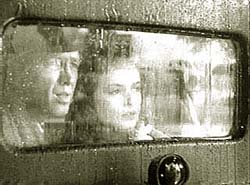You don't need me to tell you what's great about Sorokin's Studio 60. It's got everything we love about movies and more. But the complex and morally inconsistent characters, beautiful camera work, broad scope in sets and setting, and glimpses into the social anthropology of a world where few of us ever go (though we can hope, we strivers) promise to go on for years to come.
Here's the storytelling technique I found so simple and effective. For nearly three quarters of the show we learn that Harriet Hayes (Sarah Paulson) and Matt Albie (Matthew Perry) had a bad breakup. The cover story is about Harriet singing the National Anthem and Matt not showing up to support her. It smells funny. A couple of WGA awards-dinner guests say so. Harriet's still angry and maybe hung up on Matt. He's at least as angry and hurt, and angry about being forced out of the SNL look-alike. So when they finally run into each other back stage, we're ready for fireworks.
The scene stands out for it's talkiness, but it's full of drama for the thinking viewer. Matt thinks Harriet used her singing appearance on Pat Robertson's 700 Club to pander to a market of Christian-music buyers whose politics she disagrees with. Politics that Matt violently disagrees with. His view: her Christianity allows her to see fundamentalist spiritual depth without seeing fundamentalist moral paranoia and political mercilessness. Harriet has a soft spot for the dignity Christians find in faith: "That moves me." And neither of them is going give an inch.
What's makes the scene so strong is that it gives us exposition and numerous character beats: Matt and Harriet's allegiances, hard-headedness, passion, and manner of thinking. And what's infinitely refreshing to see on TV is that what characters think does matter. But what stands between these two is belief about the effect of our actions, not on PR, but on the balance of morality in the public sphere. So far at least, Matt has the last pragmatic word: "Be funny for us on Friday night, and we won't have any problems." Then he bounds upstairs, taking the high road, before meeting his partner Danny Tripp (Bradley Whitford) and addressing the entire cast.
The scene paid off as fireworks between Harriet and Matt, not by being big and loud, but by being about something so important to both characters that neither of them can budge. And it sets our expectations for much more to come: religion, philosophy, logical and moral inconsistency and their consequences, striving to produce great work, and discovering what you'll do for love. That's what's coming, people. Thank god for the internet. Otherwise, you'd see me drooling.
The crap factor on TV is way way down. The biggest challenge for the show is to find fresh new antagonists beyond the network suits to keep Studio 60 relevant in the new golden age of television. Anyway, I hope it's an age and not just a golden season.
Wednesday, September 20
Thursday, September 14
Justice (TV), or, the full Bruckheimer.
I like this show the way I like Las Vegas (the show, not the place) - I guiltily linger over the gleaming surfaces. Not that the writers are any help. The thing moves at rat-on-a-wheel pace.
Last night, thirty five minutes of Justice was all I could take. I realized that it's a great bad dialog instructor. Characters announce their intentions in two modes: angry confrontation, and fleeting, reluctant vulnerability. They blurt out conflict-telegraphing lines. And, scene! There are so many effects to fit in, so many low-angle shots, so many threatening-looking blocking crosses. Let's keep it moving, you writers!
I'm betting the show will last the season, distracting viewers by its pace and good-looking bad leads (It's House in a defense law firm; thank you, Rob Long.). And because the cynicism about the trail and jury system is turned all the way up, the moral and ethical questions of Law and Order are completely off the table. Maybe we're seeing a distilled reality show specimen, the compressed version of those haphazard entries that use 'real' people. But 0nce the eye candy reaches the brain, eyes will glaze over.
Does anyone remember when The Full Cleveland meant white shoes, white belt, and plaid pants? I have been delighted by Jerry Bruckheimer's shows and movies (The Rock, Black Hawk Down, Top Gun, Beverly Hills Cop, I could go on). The man knows how to blow things up in the most entertaining way. But the Full Bruckheimer - hard, cold, computerized, cynical, seductive, relentless and overwhelming - hey, get that stuff out of my living room.
Last night, thirty five minutes of Justice was all I could take. I realized that it's a great bad dialog instructor. Characters announce their intentions in two modes: angry confrontation, and fleeting, reluctant vulnerability. They blurt out conflict-telegraphing lines. And, scene! There are so many effects to fit in, so many low-angle shots, so many threatening-looking blocking crosses. Let's keep it moving, you writers!
I'm betting the show will last the season, distracting viewers by its pace and good-looking bad leads (It's House in a defense law firm; thank you, Rob Long.). And because the cynicism about the trail and jury system is turned all the way up, the moral and ethical questions of Law and Order are completely off the table. Maybe we're seeing a distilled reality show specimen, the compressed version of those haphazard entries that use 'real' people. But 0nce the eye candy reaches the brain, eyes will glaze over.
Does anyone remember when The Full Cleveland meant white shoes, white belt, and plaid pants? I have been delighted by Jerry Bruckheimer's shows and movies (The Rock, Black Hawk Down, Top Gun, Beverly Hills Cop, I could go on). The man knows how to blow things up in the most entertaining way. But the Full Bruckheimer - hard, cold, computerized, cynical, seductive, relentless and overwhelming - hey, get that stuff out of my living room.
Subscribe to:
Comments (Atom)


